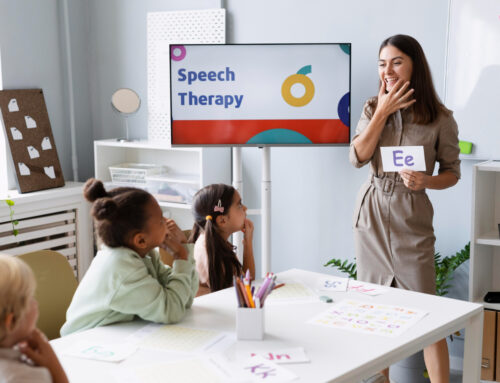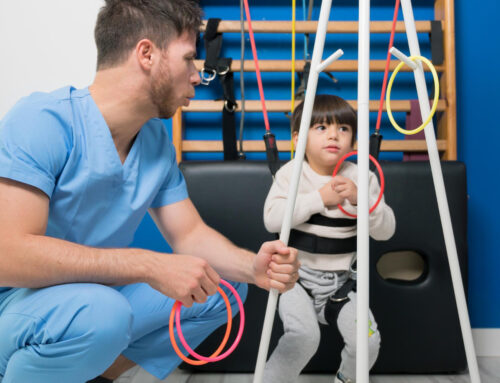As a parent, figuring out what kind of therapy your child might need can feel overwhelming. Not only is it hard to recognize when therapy is necessary, but it can also be challenging to know the right time to start. At Theracare Pediatrics Services, we support parents like you in making the best choices to improve your child’s well-being.
Speech therapy involves different activities to help your child with communication, language, and speech challenges. On the other hand, occupational therapy focuses on improving motor skills, balance, and coordination and helping with everyday tasks.
If you think your child might benefit from speech or occupational therapy, don’t wait! Read on to learn more about the advantages of these therapies, how they work, and how to figure out what’s best for your child.
What is Speech Therapy?

Speech therapy helps people improve their ability to speak and communicate. A trained expert, a speech-language pathologist (SLP), usually provides this therapy.
For children, speech therapy often uses fun and interactive methods, such as playing games, reading books, and using pictures, to make learning easier and more engaging.
What Does Speech Therapy Help With?
Speech therapy can address various speech and communication issues based on what a child needs help with:
- Articulation: If a child has trouble pronouncing words or sounds correctly, like having a lisp, speech therapy can help. For instance, they might work on saying “s” sounds clearly.
- Resonance: This involves voice problems, such as speaking too softly or too loudly or mumbling. Speech therapy can help improve how clearly and effectively a child’s voice comes across.
- Fluency: This includes issues with speaking smoothly. For example, a child might repeat sounds or have trouble finishing words. Speech therapy can help them communicate more smoothly.
In addition to these, speech therapy can also help with:
- Receptive Disorders: If a child has trouble understanding or processing what they hear, speech therapy can help them improve their comprehension.
- Cognitive-Communication Disorders: These are issues related to thinking and communicating. For example, if a child struggles with organizing their thoughts or staying on topic, speech therapy can provide strategies to improve these skills.
- Expressive Disorders: If a child has difficulty putting words together to express their thoughts, speech therapy can assist them in forming sentences and communicating better.
Speech therapy is designed to help children overcome various communication challenges and improve their ability to speak, understand, and interact with others.
How Do I Know If My Child Needs Speech Therapy?

As a parent, you know your child better than anyone. Each child is different, so signs of needing speech therapy can vary based on age and development.
Here are some common signs that might suggest your child could benefit from speech therapy:
1. Stuttering or unusual babbling
2. Unusual voice volume or tone
3. Speech that doesn’t make sense
4. Difficulty understanding what your child says
5. Trouble pronouncing certain sounds
6. Not talking at school or home
7. Not using gestures to communicate
8. Issues with making verbal requests
Speech therapy can start at any age; the earlier it begins, the better the results will likely be. If you notice any of these signs, it’s a good idea to get a speech evaluation as soon as possible.
A speech therapist will carefully assess your child’s communication skills and focus on areas that need improvement. At Theracare Pediatrics Services, experienced speech therapists make sure that therapy is enjoyable and engaging for your child.
What is Occupational Therapy?

Occupational Therapy helps children who have physical, sensory, or mental challenges. The main goal is to help kids become more independent and handle daily tasks independently. This can include improving hand-eye coordination, learning to dress themselves, and developing fine motor skills.
Children with developmental delays or disabilities, such as learning problems, autism, sensory processing issues, mental health concerns, or behavioral challenges, can benefit from Occupational Therapy.
It’s also helpful for children with specific medical conditions, like hand injuries, spina bifida, amputations, or cancer, as it can support their recovery and daily functioning.
How Do I Know If My Child Needs Occupational Therapy?

If your child is having trouble with everyday activities or if school staff has mentioned difficulties in their academic performance, it might be time to consider an evaluation. Occupational Therapists can assess your child’s skills to see if they would benefit from therapy.
Here are some common signs that your child might need Occupational Therapy:
1. Not reaching developmental milestones, like crawling or walking, on time
2. Difficulty with play or social skills
3. Problems with fine motor skills, such as holding a pencil or other objects
4. Issues with handwriting or forming numbers
5. Trouble with balance, coordination, or hand-eye coordination
6. Difficulty with visual tasks, like copying shapes or letters or understanding concepts like right and left
7. Sensory processing issues, like being overly sensitive to sounds or movements
Speech Therapy vs. Occupational Therapy— Experience the Benefits in Your Children with Theracare Pediatric Services.
In conclusion, both Speech and Occupational Therapy play important roles in helping children with different needs. Speech Therapy focuses on improving communication skills, while Occupational Therapy addresses broader skills related to daily activities and motor functions. Depending on your child’s needs, one or both types of therapy might be beneficial.
At Theracare Pediatric Services, we specialize in providing both Speech and Occupational Therapy to support your child’s growth and development. Our experienced therapists create personalized plans to help your child thrive in their daily life and reach their full potential.
If you have any questions or want to learn more about how we can help your child, please contact us today!





